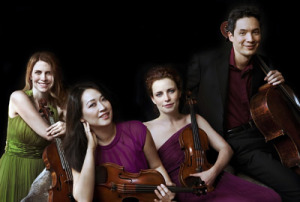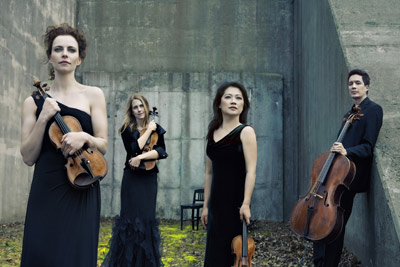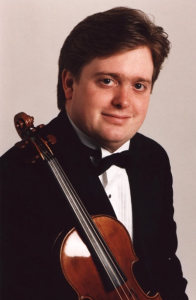Chamber Music Concerts (CMC) has been entertaining classical music audiences in the Rogue Valley with performances of chamber music for 31 seasons. The majority of the concerts, like most composed chamber music, have featured trios or string quartets (usually a pair of violins, a viola, and a cello). On the first weekend in March 2015, however, CMC presented a pair of concerts which offered chamber music fans an uncommon delight, an opportunity to hear Felix Mendelssohn’s string quintets (which enhance the music by including a second viola): on Friday, March 6, the program featured Mendelssohn’s String Quintet no. 1 in A Major and on Saturday, March 7, Mendelssohn’s String Quintet no. 2 in B-flat Major.
To backtrack a little, for this pair of concerts, CMC hosted the Daedalus Quartet, which performed two additional pieces (for quartet), for each program, besides the Mendelssohn Quintets. On Friday, the pre-intermission quartet faire consisted of Schumann’s String Quartet in F Major and Mieczyslaw Weinberg’s String Quartet no. 10, and on Saturday, the pre-intermission quartet pieces performed were Mozart’s String Quartet in G Major and Jean Sibelius’s String Quartet in D Minor (“Intimate Voices”). At each concert, after intermission, the Daedalus Quartet was joined by violist, Martin Beaver, for the performances of the respective Mendelssohn String Quintets.
A little bit of background about the artists: The Daedalus Quartet was formed 13 years ago by violinists Min-Young Kim and Matilda Kaul, violist Jessica Thompson, and cellist Thomas Kraines. The award-winning members of the Daedalus Quartet hold degrees from the Juilliard School, Curtis Institute, Cleveland Institute, and Harvard University. Praised by The New Yorker as “a fresh and vital young participant in what is a golden age of American string quartets,” the Daedalus Quartet has established itself as a leader among the new generation of string ensembles. The Daedalus Quartet has received numerous plaudits for the security, technical finish, interpretive unity, and sheer gusto of its performances. Since its founding, the Daedalus Quartet has performed in many of the world’s leading musical venues; in North America, these include Carnegie Hall, Lincoln Center, the Library of Congress, the Corcoran Gallery in Washington, D.C., Boston’s Gardner Museum, and in Montreal, Toronto, Calgary, Winnipeg, and Vancouver, Canada. Internationally, the ensemble has performed in the Musikverein in Vienna, the Mozarteum in Salzburg, the Concertgebouw in Amsterdam, the Cité de la Musique in Paris, and in leading venues in Japan.

Daedalus Quartet- violist Jessica Thompson, violinists Min-Young Kim and Matilda Kaul, and cellist Thomas Kraines
The Daedalus Quartet has formed associations with some of America’s leading classical music and educational institutions: Carnegie Hall, through its European Concert Hall Organization (ECHO) Rising Stars program; and Lincoln Center, which appointed the Daedalus Quartet as the Chamber Music Society Two quartet for 2005-07. The Daedalus Quartet has been Columbia University’s Quartet-in-Residence since 2005, and has served as Quartet-in-Residence at the University of Pennsylvania since 2006. In 2007, the Quartet was awarded Lincoln Center’s Martin E. Segal Award. The Quartet won Chamber Music America’s Guarneri String Quartet Award, which funded a three-year residency in Suffolk County, Long Island from 2007-2010.
The Quartet has released an impressive string of recordings, including: their debut recording released by Bridge Records in 2006, including music of Stravinsky, Sibelius, and Ravel; a Bridge recording of the Haydn’s complete “Sun” Quartets, Op. 20, released on two CDs in July 2010; an album of chamber music by Lawrence Dillon (Fall 2010); followed by a recording of the complete string quartets of Fred Lerdahl (Fall 2011); a recording of Joan Tower’s “White Water” (written for Daedalus) as well as her “Dumbarton Quintet” (with pianist Blair McMillen) released in Spring 2014; and their most recent recording, on Bridge Records, featuring the string quartets of George Perle.
Martin Beaver, who joined to form the quintet for performances of the Mendelssohn pieces, is a Canadian violinist, who is best known as first violinist of the Tokyo String Quartet from 2002 to 2013, when that ensemble disbanded. “Beaver is known for his technical agility, versatility, warm tone, and prodigious memory for the violin repertoire. He currently performs on a violin made by the luthier Nicola Bergonzi.”
Mr. Beaver is a multiple award winning violinist, including: the Sanford Medal from Yale University (2013), Canada Council’s Virginia P. Moore Award for most promising young Canadian classical artist (1993), first prizes at the Queen Elizabeth Competition in Belgium (1993), the Montreal International Music Competition (1991), and the International Violin Competition of Indianapolis (1990). Mr. Beaver can be heard performing on an extensive number of recordings, including recordings for the Rene Gailly, Naim Audio, NAXOS and both of Canadian Broadcast Corporation’s Record labels, as well as with Harmonia Mundi with the Tokyo String Quartet. Mr. Beaver is a devoted music educator, having taught at The Royal Conservatory of Music, the University of British Columbia, the Peabody Conservatory of Music of Johns Hopkins University, the Steinhardt School of New York University, and been Artist in Residence at the Yale School of Music. In August 2013, he joined the faculty at The Colburn School in Los Angeles, CA as co-director of the String Chamber Music Studies Program and Professor of Violin. He remains active in both chamber music and as a soloist, and recently established the Montrose Trio with pianist Jon Kimura Parker and cellist Clive Greensmith.
I had the pleasure of attending the March 7 concert, at which the Daedalus Quartet performed the Mozart’s String Quartet in G Major and Jean Sibelius’s String Quartet in D Minor (“Intimate Voices”), and then were joined by Mr. Beaver for the performance of Mendelssohn’s String Quintet no. 2 in B-flat Major.
The Mozart Quartet, a short piece of under 15 minutes duration, was the very first string quartet composed by the prodigious musical prodigy, at the age of 14, while on tour of Italy with his father in 1770. Though it is not as musically complex as his later works, it does display the genius’s mastery of chamber music. The first three movements, in an Italian style, were reputedly composed in a single sitting, and the fourth, a French Rondeau, was added two years later. The piece was a very apt choice for the Daedalus Quartet to open this concert program, as it offers a number of duets for the violins, especially in the second movement (Allegro), that allowed Ms. Kim and Ms. Kaul to demonstrate just how wonderfully in sync the two violinists and their playing could be: they played like twins. The piece also provided passages where the Quartet could show the audience that they play with a lot of energy, a quality for which they are renowned. It was obvious that the four musicians were having fun, and enjoying playing the piece, certainly not just going through the motions as sometimes can be the case with a string ensemble playing a familiar piece for the umpteenth time during a stop on an extended concert tour.
Next on the Saturday program was the Sibelius, String Quartet in D Minor (“Intimate Voices”). This 30 minute piece, composed by Sibelius from 1908-1909 between his 3rd and 4th Symphonies, was his only mature string quartet and the only significant chamber work he produced in the 20th Century. As Sibelius’s subtitle, “Intimate Voices”, suggests, this chamber piece conveys a profoundly intimate atmosphere, in stark contrast to his symphonic works. Once again, this piece was an inspired choice for the Daedalus Quartet to include on the concert program, providing the ensemble with a wonderful vehicle to share with the audience the incomparable quality of the conversation between the four instruments by these tightly integrated musicians. The Sibelius also provided an opportunity to highlight the gorgeous tone of Mr. Kraines cello performance. I particularly enjoyed the Quartet’s lively, energetic performance of the 5th movement (Allegro). Recording was not possible at this concert, so it is not possible to present a sample of any of the actual concert performance here. However, the Daedalus Quartet has recorded the Sibelius String Quartet in D Minor on a 2006 Bridge Records CD. And the five movements of the Bridge recording can be heard online on YouTube. So one can acquire a general sense of what the performance of the exciting 5th movement was like, as it builds to a spirited climax, by listening to this Daedalus Quartet recording of the Allegro:
Daedalus Quartet
Jean Sibelius
String Quartet in D. Minor, Op. 56, Intimate Voices: V. Allegro
Bridge
You just have to take my word for it, that the live performance was even better than the recording – the ability to see the musicians in motion, with flourishes of activity, bows flying, and energy passing from one to the next as the music unfolds, is, as the famous ad says, “priceless!”
Which brings us finally, after intermission, with the addition of violist Martin Beaver on stage, to the performance of Mendelssohn’s String Quintet no. 2 in B-flat Major. A mature Mendelssohn composed this 30 minute piece, consisting of four movements, in 1845. It was a joy to hear this not-as-commonly performed chamber music piece played by these consummate musicians. It was startling how much richer and fuller this piece sounded, compared to the quartets, with the addition of a second viola. The first movement, an Allegro vivace, was very lively, almost turbulent in the hands of this ensemble. One should note that there was no drop off in the quality of the ensemble interplay, no loss of synchrony, with the addition of Mr. Beaver. The second movement, an Andante scherzando, very brief and concise, was a stark contrast to the first, being calm, gentle and relaxing – sedate really, compared to the strong, emotional first movement. The third movement, an Adagio e lento, was melancholy and lyrical, with the two violins sounding emotional and expressive, while the deeper instruments, the violas and cello, were darker and mysterious. Mendelssohn’s music in this movement exploits the full potential of each of the instruments, and the five musicians all performed true to those respective potentials. The fourth, final, movement, an Allegro molto, was brisk and energetic. The first violin and cello each performed exceptional, exquisite solo passages during this movement.
This was an intelligently constructed, well planned concert, each piece building towards the next, and the final, the Mendelssohn’s String Quintet representing a pinnacle, a triumph of how special, how beautiful, how exquisite a chamber music piece can be. Leaving the hall after this concert, I had only one regret: that there isn’t a recording of Mendelssohn’s String Quintets by this ensemble which I can play to relive the experience. Surely there must be a record publisher somewhere that would be interested to record these quintets, and I can’t imagine a better ensemble than this to perform on the recording. Many thanks to Chamber Music Concerts for bringing the Daedalus Quartet and Martin Beaver to the Rogue Valley and scheduling these extraordinary concerts, offering us these superb and unique performances.
Chamber Music Concerts will next present The Elias String Quartet in concert on Friday, April 3, 2015 at 7:30 pm, at the SOU Music Recital Hall in Ashland. This quartet, which takes their name from the German form of Mendelssohn’s oratorio, Elijah, was formed in 1998 at the Royal Northern College of Music in Manchester, and have quickly established themselves as one of the most intense and vibrant quartets of their generation, with memorable performances at New York’s Carnegie Hall, the Washington Library of Congress, the Musikverein, Vienna, and the Berlin Konzerthaus. For their CMC concert, they will perform Mozart’s String Quartet in C Major, “Dissonance”, Dutilleux’s Ainsi la nuit (Thus the Night), and Beethoven’s String Quartet in C-sharp Minor. For tickets, call Chamber Music Concerts at 541-552-6154 or purchase tickets online at http://bit.ly/1od9M1j.
Featured image above: Daedalus Quartet-violinist Matilda Kaul, violist Jessica Thompson, violinist Min-Young Kim, and cellist Thomas Kraines. Photos of Daedalus Quartet by Lisa-Marie Mazzucco.


 Lee Greene was born & raised in a NJ family where the only religion worshipped was classical music, Leonard Bernstein was God, and the radio was constantly on and tuned to classical station WQXR (which is now always on in his Jacksonville home thanks to the miracle of the Internet). Growing up in the New York City metropolitan area and later while residing and practicing law in NYC, Lee attended oodles of Broadway and off-Broadway theater productions, as well as concerts and opera at Lincoln Center, Carnegie Hall and other NYC venues. Lee is now a retired attorney, runs a computer support business, and has served on the boards of Rogue Opera & Siskiyou Violins. Lee also writes Performing Arts reviews published on the website,
Lee Greene was born & raised in a NJ family where the only religion worshipped was classical music, Leonard Bernstein was God, and the radio was constantly on and tuned to classical station WQXR (which is now always on in his Jacksonville home thanks to the miracle of the Internet). Growing up in the New York City metropolitan area and later while residing and practicing law in NYC, Lee attended oodles of Broadway and off-Broadway theater productions, as well as concerts and opera at Lincoln Center, Carnegie Hall and other NYC venues. Lee is now a retired attorney, runs a computer support business, and has served on the boards of Rogue Opera & Siskiyou Violins. Lee also writes Performing Arts reviews published on the website,